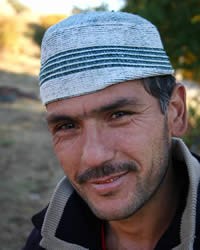Afghan, Tajik in Afghanistan

Photo Source:
Steve Evans - Flickr
Creative Commons
|
Send Joshua Project a map of this people group.
|
| People Name: | Afghan, Tajik |
| Country: | Afghanistan |
| 10/40 Window: | Yes |
| Population: | 12,313,000 |
| World Population: | 12,732,000 |
| Primary Language: | Dari |
| Primary Religion: | Islam |
| Christian Adherents: | 0.01 % |
| Evangelicals: | 0.01 % |
| Scripture: | Complete Bible |
| Ministry Resources: | Yes |
| Jesus Film: | Yes |
| Audio Recordings: | Yes |
| People Cluster: | Tajik |
| Affinity Bloc: | Persian-Median |
| Progress Level: |
|
Introduction / History
Afghanistan boasts the largest Tajik population outside their homeland to the north in Tajikistan. Comprising over one-quarter of the Afghan population, they are the largest group in the country. Dating from the 4th century, historical evidence strongly supports their being one of the most ancient of the surviving Central Asian people groups. A Mediterranean sub-group of the Caucasian race, modern Tajiks are descended from Persian peoples. A tall, slender, fair-skinned people with blue or green eyes and often with red or blond hair, intermarriage with Turks and Mongolians introduced almond-shaped eyes and straight black hair to their physical characteristics.
What Are Their Lives Like?
An old Turkish expression, "Tajik," is synonymous with "Persian". They have always spoken Persian (speaking the related Dari dialect in Afghanistan) whereas other Persian language speakers in Central Asia adopted the language. Most often they refer to themselves by the valley name of their home region rather than as Tajik. One vast habitat is the rugged, mountainous Panjsher Valley north of Kabul, where poor farmers and herders live in villages of flat-roofed mud brick or stone houses. When water is plentiful, the country's finest fruits and nuts, as well as various grain crops, are produced here. Ahmad Shah Masoud, Afghanistan's revered Taliban resistance leader who was assassinated in 2001, was a native son of this valley. Smaller concentrations of Tajiks live in Herat Province on the western border with Iran. A third group, large and more educated, lives in Kabul where they have enjoyed economic success and political influence. Merchants and highly talented craftsmen are also a segment of these urban dwellers. Because large Tajik families are close-knit, city-dwellers are known to maintain close ties with their relatives in the countryside.
Originally a tribal group, they abandoned strict organizational structure long ago. However, cultural traditions are guarded and observed - traditions that survived centuries of invasion by forces ranging from ancient Arab hordes to recent Taliban fighters. One social tradition is that of offering extraordinary hospitality - a practice shared with other Afghan peoples. Hosting guests is considered an honor - an occasion for a fine meal. "Osh", a special dish prepared by Tajik men, contains rice, lamb, spices and vegetables and may be served with flat bread rounds baked with a blend of several flours, fruit, yogurt and tea. Even poor farmers welcome guests with tea, bread and yogurt.
What Are Their Beliefs?
Forcefully converted to Islam by Arabs in the 7th century, Afghan Tajiks remain almost entirely Muslim. Religious traditions dictate rituals to celebrate important life passages, including birth, marriage and death. Memorized prayers are recited daily, and in some communities old practices incorporating magic, charms and animistic beliefs still have a place.
What Are Their Needs?
The Islamic religion is very difficult to influence. Converts to Christianity will more than likely be "banished" from their families. Because of this, the Tajiks, though usually warm and hospitable, are becoming more and more apprehensive towards outsiders.
The Tajiks speak Dari Persian, a language that came from King Darius (mentioned in the book of Daniel). Unfortunately, only about one-tenth of the Tajiks are able to read.
Prayer Points
Ask God to provide peace, stability and justice to Afghanistan.
Ask God to call Christian workers who are trained in the Dari language to take the gospel to the Tajiks.
Pray that the Christian relief workers who are working in Pakistan will be effective witnesses among the Tajiks who have been displaced from their homes.
Pray that relief funds will be made available for those living in famine-stricken areas.
Pray that strong local churches will be planted among the Afghani Tajik.